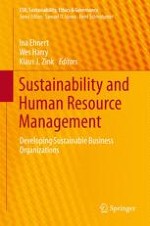2014 | OriginalPaper | Buchkapitel
Paradox as a Lens for Theorizing Sustainable HRM
Mapping and Coping with Paradoxes and Tensions
verfasst von : Ina Ehnert
Erschienen in: Sustainability and Human Resource Management
Verlag: Springer Berlin Heidelberg
Aktivieren Sie unsere intelligente Suche, um passende Fachinhalte oder Patente zu finden.
Wählen Sie Textabschnitte aus um mit Künstlicher Intelligenz passenden Patente zu finden. powered by
Markieren Sie Textabschnitte, um KI-gestützt weitere passende Inhalte zu finden. powered by
